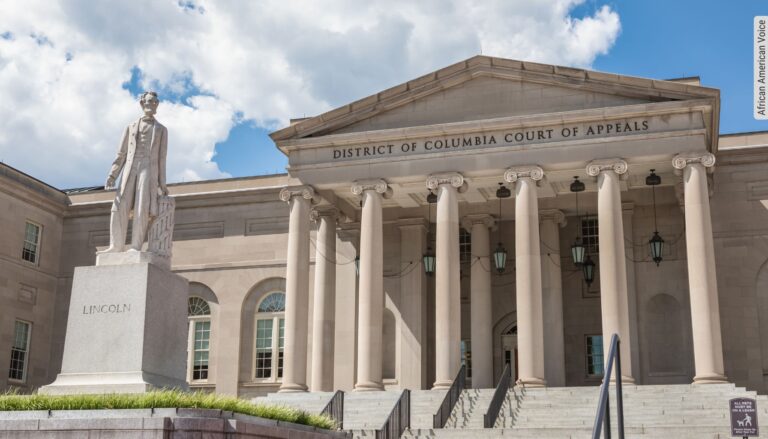
by
In a matter of months, Jay Jones will graduate from Howard University (HU) — one of educational institutions that received a letter from the Trump administration mandating that they eliminate race-based educational programming and policies or risk losing their federal funding.
While Jones, a speaker at HU’s Charter Day Convocation, didn’t directly speak about the Trump administration’s recent demand, she encouraged those sitting in Cramton Auditorium to reflect on the significance of March 2, 1867, when President Andrew Johnson signed the federal charter that brought their beloved university into existence.
“This act defined Howard as a place of higher learning, dedicated to training African Americans in critical fields such as law, medicine, and science — fields that were seen as essential at the time,” Jones told hundreds of students, faculty, staff, board members and community members on Feb. 28 — the U.S. Department of Education (DOE) Office for Civil Rights’ compliance deadline.
“As we embark on the 158th anniversary of Howard University’s founding, we can truly see how relevant and essential the mission established back then remained in the 21st century,” she continued. “Our commitment to producing the world’s best Black lawyers, doctors, philosophers, and leaders continues no matter how much our world truly does evolve.”
Jones, a senior and HU’s first trans woman student body president, gave her remarks near the end of a nearly two-hour ceremony where community members also heard from HU President Ben Vinson III and keynote speaker D.C. Mayor Muriel Bowser. Other parts included the invocation and benediction by the Rev. Dr. Bernard L. Richardson, dean of Andrew Rankin Memorial Chapel, and musical selections from the Howard University Chorale.
In less than five minutes, Jones elicited cheers and hand claps as she spoke about the university perched on the hilltop “against the eastern sky” during the darkest of times, paying homage to HU alumni: the last Supreme Court Justice Thurgood Marshall, former Vice President Kamala Harris, and the first Black U.S. Army general Benjamin O. Davis, Sr.
Toward the end of her remarks, Jones gave her peers and other HU community members a call to action.
“I leave you here with the enduring dream of our forefathers and foremothers that carried through times of hardship,” she said. “When we’ve gone away, may we continue to strive each day. And as we all sail life’s running seas, oh Howard, how we will sail. Don’t lose hope in her, because she will never lose hope in us.”
HU President Vinson Looks to the Future
In the days leading up March 2, HU community continued to celebrate a 158-year milestone with a charter day dinner where actor, producer and HU alumnus Anthony Anderson served as master of ceremonies and received the Distinguished Alumni Award. Other award recipients include: Nelson Leon Adams III, Sunny Sumter, Donald A. Thigpen, Jr., and Christopher J. Tyson.
Carrie Hackney, HU Divinity librarian, also received the LaRue V. Barkwell Capstone Distinguished Service Award.
During the Feb. 28 charter day convocation, Vinson recognized students who would be receiving scholarships funded with alumni contributions. He later reminded HU community members, particularly students, and young people from Howard University Middle School of Math and Science Public Charter School and HU’s Early Learners program, about what he called their roles in preserving the legacy of HU.
“You carry the torch of this institution in every space you inhabit, every office you work in, every room you enter, every interaction you take,” Vinson said, just moments after staff members gifted dozens of early learners with HU paraphernalia. “Charter Day for me is exactly this: a moment to pause, to take time, to touch the annals of history so that those very annals can grow, can continue to live within us, to renew our purpose, to refresh and restore our soul.”
Since its 1867 inception, HU has expanded from one building to 14 schools and colleges. The campus spans more than 89 acres, which includes Howard University Hospital, HU School of Law, HU School of Divinity West Campus, a facility in Northeast and a tract of land in Beltsville, Maryland.
Well before, and especially after, the Supreme Court dismantled affirmative action, HU and other historically Black colleges and universities (HBCUs) experienced an enrollment boost that, at one point, increased pressure on academic systems. More than 13,000 students currently attending HU hail from every U.S. state, D.C. and more than 70 countries. They can also participate in 19 varsity sports — including basketball, football, tennis, volleyball, swimming, and indoor and outdoor track.
Students also have at their disposal a university library system with more than 1.8 million volumes and the Moorland-Spingarn Research Center, which received a grant in 2023 for the digitizing of Black Press archives. In 2023, HU continued to forge ties on the federal level with a multi-million research deal with the Air Force and U.S. Department of Defense. Other advancements include the hiring of Dr. Ibram X. Kendi and Nikole-Hannah Jones, two prolific Black academics and writers who made their exodus from predominantly white institutions.
Most recently, HU became the first and only historically Black college or university to receive a Research One (R1) designation, based on what the American Council of Education calls “high research spending and doctorate production.”
Even with such success, there remains the dark cloud of what many call a stronger and more dangerous Trump presidency.
The Trump administration’s controversial Valentine’s Day letter to U.S. colleges and universities comes on the heels of other actions that President Donald J. Trump, since taking office in January, took against HBCUs, and postsecondary institutions serving Latino and Indigenous American populations.
Though an HU spokesperson confirmed that higher-level conversations about Trump’s letter are ongoing, they didn’t reveal specifics about when, or whether, university officials would publicly denounce the DOE directive.
Like Jones, Vinson focused on HU’s legacy as a North Star in navigating a situation eerily similar to what newly freed Black men and women faced during ithe Reconstruction Era.
“We were founded in turbulent times, but we were founded with unqualified purpose,” Vinson said. “Charter Day reminds us that in these walls, in this sacred space that we call the Mecca, we are encouraged to be our best selves, to innovate, to inquire, to be bold, to discover the frontiers of excellence, to soar, and to imagine the full potential and the endless possibilities of our world.”
Mayor Bowser Speaks
In years past, some innovations at HU happened in partnership with Mayor Bowser, who Vincent awarded with the President’s Medal of Achievement on Feb. 28.
Throughout Bowser’s mayoralty, HU has collaborated with the D.C. government on projects of benefit to both parties, including a tech incubator on Georgia Avenue aimed at assisting entrepreneurs from historically marginalized communities; a program connecting HBCU alumni with D.C. government jobs; and more recently, a paramedic program partnership with University of District of Columbia in which HU Hospital will provide a space for clinical rotations.
These arrangements come just as HU and the Bowser administration prepare for the construction of a new hospital that includes a Level 1 trauma center and a space for teaching the next generation of medical professionals.
The hospital, scheduled to open by 2026, will receive a $225 million, 20-year tax abatement from the District, along with another $25 million in infrastructure support, another $26.6 million over six years for five Centers of Excellence at the hospital, and the presence of an on-site D.C. government agency on site.
In her keynote address, Bowser gave kudos to Howard University as she acknowledged alumni who served, and continue to serve, in her administration. She also touted what she described as HU administration’s enthusiasm for partnering with the District on consequential projects — including the new HU Hospital.
“When I said to the leadership at Howard University, I’m going to do all that I can to make sure that you continue to educate the most Black doctors in the United States of America, you answered the call,” Bowser said. “So we look forward to our more than $200 million investment. The city, our taxpayers, and it is with your partnership that the story of our city today is much different than the story of 1867.”
As Bowser also faces questions of what will become of D.C. home rule under the second Trump presidency, she also framed HU’s 158-year history as an opportunity to affirm a commitment to the values shared by the university and D.C. government.
“Our stories and our histories and our futures are intertwined [but] there’s an important part of our story that hasn’t changed,” Bowser said. “The fact that our democracy and freedoms are still vulnerable and still worth fighting for. So if you’re looking for hope in this moment, I hope that you will continue to know that the partnership between Howard University and the city is a strong one.”







